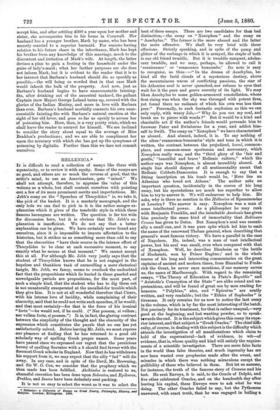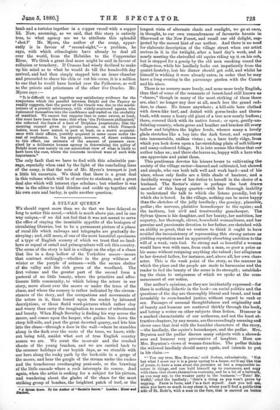HELLENICA.* IT is difficult to read a collection of essays
like these with eqnanimity, or to review it with equity. Some of the essays are -so good, and others are so much the reverse of good, that the Acritic's mind, to use an Americanism, gets "mixed." We 'shall not attempt, therefere, to appraise the value of this ^volume as a whole, but shall content ourselves with pointing 'out a few of its more prominent merits and imperfections. Mr. Jebb's essay on the "Speeches of Thucydides " is, we take it, the pick of the basket. It is a masterly monograph, and the 'only hole we can find to pick in it is the rather meagre ex- planation which it gives of the tenebrific style in which these famous harangues are written. The question is far too wide for discussion here, but it is obvious that Mr. Jebb's ex- planation is insufficient. We do not say that a better 'explanation can be given. We have certainly never found any ourselves, since it is impossible to impute affectation to the historian, but it strikes us as something more than odd to say -that the obscurities "have their source in the intense effort of 'Thucydides to be clear at each successive moment, to say exactly what he means at that moment." We cannot accept this at all. For although Mr. .Tebb very justly says that the student of Thucydides knows that he is not engaged in the -hopeless and thankless task of unravelling a mere rhetorical tangle, Mr. jebb, we fancy, seems to overlook the undoubted fact that the propositions which lie buried in these gnarled and unwedgeable periods are propositions, for the most part, of such a simple kind, that the student who has to dig them out is not unnaturally exasperated at the uncalled-for trouble which they give him. It is not at all wonderful therefore that Cicero, with his intense love of lucidity, while complaining of their obscurity, said that he could not write such speeches, if he would; and that most certainly—for that is the force of his ironical "forte "—he would not, if he could. (" Nec possem, Si vellem ; nee vellem forte, ei possem.") It is, in fact, the glaring contrast between the simplicity of the thought and the obscurity of the expression which constitutes the puzzle that no one has yet satisfactorily solved. Before leaving Mr. Jebb, we must express Our pleasure at finding that he has returned to a good old scholarly way of spelling Greek proper names. Some years have passed since we expressed our regret that the pernicious heresy of spelling Socrates with a k should find favour with the foremost Greek scholar in England. Now that he has withdrawn his support from it, we may expect that the silly " fad " will die away. In any case, and in spite of the Devil, Mr. Browning, • and Sir W. G. Cox, we consider that the prophecy which we then made has been fulfilled. Alcibiades is restored to us, shameful execution has been done upon Sokrates, and Epikuros, Proklos, and Isaeos have been definitely sent packing.
It is not so easy to select the worst as it was to select the • Heilenica: a Collection of Essays on Greet Poetry, Philosophy, History, and &IVO:ft London: It'll:41one. 1880. best of these essays. There are two candidates for that- bad distinction,—the essay on " Xenophon " and the essay on "Aeschylus." The former is the more absurd and the latter the more offensive. We shall be very brief with these effusions. Strictly speaking, and in spite of the pomp and glitter of the verbiage in which it is arrayed, the staple of both is our old friend twaddle. But it is twaddle rampant, adoles- cent twaddle, and we may, perhaps, be allowed to call it 'renaissance' or renascence buncombe.' Its note is easy to recognise, as thus : —" In the drama of Aeschylus, be- hind all the lurid clouds of a mysterious destiny, above the mountainous waves of conflicting passions, the star of his Athenian soul is never quenched, nor refuses to eyes that wait for it the pure and grave serenity of its light. We may liken Aeschylus to some golden-armoured constellation, whose first rising was when the sky was thronged with potent fires, yet found there no radiance of which his own was less than peer." Personally, to such fantastic euphuism as this we can only reply, with weary Job,—" Why do you vex my soul, and break me to pieces with words P" But it would be a kind and charitable act if the author's friends would persuade him to forswear Pater and Swinburne for a year, and addict him- self to Swift. The essay on " Xenophon " we have characterised as absurd. And absurd, indeed, it is. To say nothing of the ultra-' renascence-buncombe' style and tone in which it is written, the contrast between the prejudiced, borne, common- place, and common-sense sportsman and mercenary, which Xenophon really was, and the "third glory of the fair and gentle,' 'beautiful and brave' Hellenic culture," which the author says was Xenophon, is almost incredibly absurd. A single line should dispose of all sentimentality anent that Hellenic Cobbett-Dumouriez. It is enough to say that a fitting inscription on his tomb would be, Here lies an Athenian who loved not Athens.' The author asks an important question, incidentally in the course of his long essay, but his speculations are much too superfine to allow him to try to answer it. We will endeavour to help him. He asks, why is there no mention in the Hellenica of Epaminondas at LeuctraP The answer is easy. Xenophon was a man of some intellectual power. As a philosopher he may rank with Benjamin Franklin, and the inimitable Anabasis has given him precisely the same kind of immortality that Robinson Crusoe has given to Defoe. But Xenophon's soul was essenti- ally a small one, and it was pure spite which led him to omit the name of the renowned Theban general, when describing that general's most famous victory. We have a parallel in the case of Napoleon. He, indeed, was a man of vast intellectual power, but his soul was small, even when compared with that of Xenophon. Well, he describes Blenheim as the battle of Hochstett, won by Prince Eugene;' and in the whole course of his long and interesting commentaries on the great captains of ancient and modern times, from Hannibal to Frede- rick the Great, he never once mentions, if our memory serves us, the name of Marlborough. With regard to the remaining essays, "The Theory of Education in Plato's Republic" and "Aristotle's Conception of the State" are alike sound and un- pretentious, and will be found of great use by men reading for honours. " Polybius," also, and " Epicurus " are neatly written, and very readable ; but the "Ethics of Sophocles " is tiresome. It only remains for us now to notice the last essay in the volume, which is by far the most interesting of the batch. Not precisely for its treatment, for that is rather unequal,—very good at the beginning, and but wanting powder, so to speak- tawards the end. It is the subject which gives this essay its supe- rior interest, and that subject is "Greek Oracles." The chief diffi- culty, of course, in dealing with this subject is the difficulty which attends the investigation of all manifestations which claim to hold. of the supernatural—lack of -evidence, to wit—of evidence, that is, whose quality and kind will satisfy the require- ments of a scientific investigator. There are more false facts in the world than false theories, and much ingenuity has ere now been wasted over prophecies made after the event, and miracles in which there was nothing miraculous except the gullibility of those who believed in them. But let us assume, for instance, the truth of the famous story of Crcesus and his test. He sent Envoys, it is said, to the Oracle of Delphi, and five other celebrated Oracles, and on the hundredth day after leaving his capital, these Envoys were to ask what he was doing. The other Oracles failed to say, but the Pythoness answered, with exact truth, that he was engaged in boiling a
lamb and a tortoise together in a copper vessel with a copper lid, Now, assuming, as we said, that this story is entirely true, to what agency are we to attribute this splendid
shot ?' Mr. Myers, the author of the essay, appar- ently is in favour of "second-sight,"— a problem, he
says, with which ethnologists have already to deal all over the world, from the Hebrides to the Coppermine River. We think a great deal more might be said in favour of collusion or treachery. If Crcesus had wisely declined to make up his mind as to what he would do till the hundredth day arrived, and had then simply stepped into an inner chamber
and proceeded to shave his chin or cut his corns, it is a million to one that he would have bowled over the Pythoness, as well
as the priests and priestesses of the other five Oracles. Mr. Myers says :-
"It is difficult to get together any satisfactory evidence for the conjecture which the parallel between Delphi and the Papacy so readily suggests, that the power of the Oracle was due to the machi- nations of a priestly aristocracy, with widely-scattered agents, who insinuated themselves into the confidence and traded on the credulity of mankind. We cannot but suppose that to some extent, at least, this must have been the case • that when the Pythoness philippised,' she reflected the fears of a knot of Delphian proprietors ; that the unerring counsel given to private persons, on which Plutarch insists, must have rested, in part at least, on a secret acquaint- ance with their affairs, possibly acquired in some cases under the seal of confession. In the paucity, however, of direct evidence to this effect, our estimate of the amount of pressure exer- cised by a deliberate human agency in determining the policy of Delphi must rest mainly on our antecedent view of what is likely to have been the case, where the interests involved were of such wide importance."
The only fault that we have to find with this admirable pas- sage, especially when read by the light of the concluding lines of the essay, is that the note of Mr. Myers's trumpet is just a little bit uncertain. We think that there is a great deal in this volume which will be of service to students, and a great deal also which will interest ripe scholars ; but whether it was wise in the editor to bind thistles and cockle up together with his own corn and barley, is quite another question.



































 Previous page
Previous page